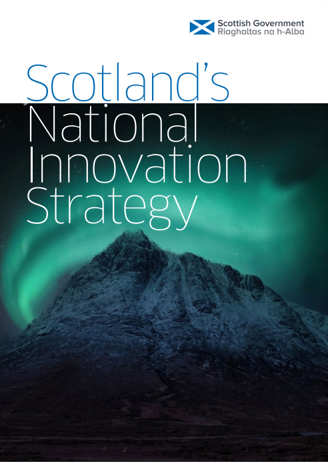FST JOURNAL
Update
Update
Scotland sets out vision for innovation with strategy launch
The Scottish Government launched its 10-year National Innovation Strategy on 9 June (see FST Journal 23-4). The strategy sets out a vision for Scotland to rank alongside Denmark, Norway and Finland in being recognised as one of the most innovative small countries in the world. It says that innovation and the ecosystem of businesses, organisations universities and talent that promote and deliver it, will drive future national and regional economic success. Innovation is “a key tool to make Scotland a fairer, more equal, wealthier and greener country.”
The document notes that: “We face challenges in maintaining our record of innovation in a rapidly changing, inter-connected world. While Scotland's productivity and business investment in Research and Development (R&D) have seen significant improvements in recent years – with the gaps to the rest of the UK largely closed – we have work to do to catch up with our international competitors. Too few Scottish businesses are innovating, and some of our most innovative companies struggle to scale.”
The strategy notes that Scotland has a competitive advantage and a strong research and business base in a number of key markets. These give rise to four broad innovation themes on which future activity will focus: Energy Transition; Health & Life Sciences; Data and Digital Technologies; and Advanced Manufacturing.
www.gov.scot/publications/scotlands-national-innovation-strategy

MRC funding now requires diversity
MRC will become the first UK research funder to require researchers to consider diversity when designing clinical and preclinical scientific experiments, it was announced at the end of June.
The new policy aims to ensure the Medical Research Council (MRC) research findings are relevant to and benefit everyone in society. It means that researchers funded by MRC will need to consider sex as well as other relevant characteristics when designing any research involving humans, animals, cells, and tissues.
In studies involving people, researchers should take into account whether characteristics such as sex, gender, age, ethnicity and socio-economic position are relevant.
Diversity and inclusion should also be part of developing public involvement and engagement activities to support research. Peer reviewers and MRC committee members will need to be mindful of these requirements when reviewing research proposals.
The policy builds on a requirement introduced in March 2022 when MRC announced that grant applications involving animal or in vitro research experiments must include both sexes as the default.
UKRI Backs research on trustworthy AI
Universities across the UK are set to benefit from a £54 million investment in their work on AI. Delivered through UK Research and Innovation (UKRI), £31 million of the funding will be used to back research at the University of Southampton to establish responsible and trustworthy AI, bringing together the expertise of academia, business, and the wider public to explore how responsible AI can be developed and utilised, while considering its broader impact on wider society.
£8 million will be allocated to two Turing AI World Leading Researcher Fellowships, funding research on some of AI’s biggest challenges including its application across drug and food design, and healthcare imaging.
£13 million will go to fund projects to help the UK meet its net zero targets. The projects will look at developing AI technologies to deliver more sustainable land management, accelerate energy efficient CO2 capture, and improve resilience for natural hazards and extreme events.
Government updates Geospatial strategy
Geospatial applications and services have become a part of everyday life, enabling routine activities and improving individual consumer experiences from instant journey planners to faster delivery of goods. These services provide vital insights for businesses and the delivery of public services.
The potential of location data is enhanced by enabling technologies, such as artificial intelligence (AI) and cloud computing, which have caused disruption and opened up huge new capabilities, according to the Government. To make the most of these enabling technologies it will be essential to overcome limiting factors, such as a lack of awareness and skills.
On 15 June, an update to the UK’s Geospatial Strategy was published looking at the latest trends and challenges impacting the geospatial ecosystem. The Government’s renewed three missions aim to position the UK’s long term direction towards the priorities of: driving technological innovation; realising benefits of applications of location data across the economy; and building confidence in the geospatial ecosystem. The actions within these missions set out the first concrete steps towards these goals.
The Geospatial Commission was established in 2018 by the government as an expert committee responsible for setting the UK’s geospatial strategy and coordinating public sector geospatial activity.
www.gov.uk/government/publications/uk-geospatial-strategy-2030/uk-geospatial-strategy-2030
